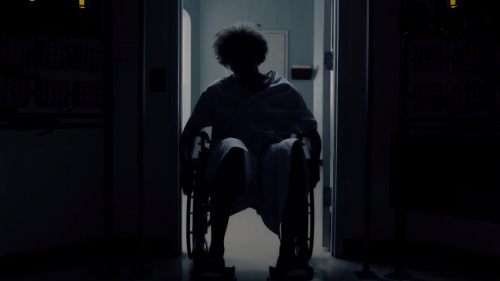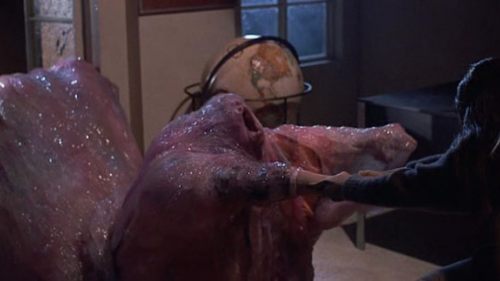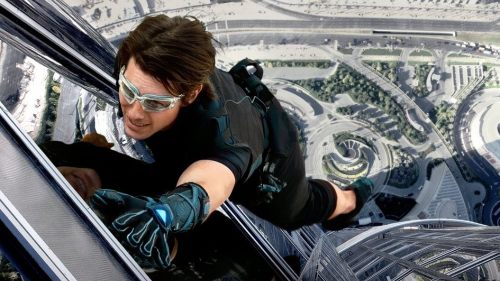Sunday Reads: David Cronenberg - Love Is The Drug
In the early ‘80s, before horror directors looked like horror fans, very few pieces written about David Cronenberg passed up an opportunity to mention just how normal he looked. Journalists lined up to eagerly point out the juxtaposition of the filmmaker’s milquetoast appearance and his nihilistic onscreen viscera, as if they were the first ones to notice it. Cronenberg would react politely each time, explaining that, as a storyteller, he was never really all that invested in mayhem or gore. Ever since childhood, he said, he was interested in writing and in science. He was a quiet, booksmart guy who figured out early on that his creative preoccupations -- which were closely tied to his scientific interests – could get financial backing if they were couched in the language of a commercial horror film.
Cronenberg himself would never be so reductive, but it’s not a stretch to guess that his early interest in science, and the way it creatively manifested itself, came from watching his father die. As Milton Cronenberg’s body gave up on him -- organs would fail, bones would break from rolling over in bed -- his mind remained intact. Watching our dearest loved ones disintegrate in a hospital bed is the purest horror most of us will ever feel. Witnessing his father’s sharp mind become trapped in a shell with a rapidly approaching expiration date was not only a devastating loss for Cronenberg; it was a wake-up call about the inevitability of disease and the certainty of death. As Cronenberg has said, “the idea that you carry the seeds of your own destruction around with you, always, and that they can erupt at any time, is…scary. Because there is no defense against it; there is no escape from it.”
An oeuvre was born.
David Cronenberg’s early films are certainly rife with biological mayhem, but he’s not simply reliving his early autobiographical trauma. That universal, existential nightmare -- the idea that our consciousness, our essence, is inextricably tethered to a rotting bag of bones headed for the slab -- is really just an engine that drives his true thematic thread: the pursuit of transcendence.
As an atheist, Cronenberg holds fast to the idea that we are finite; we are corporeal beings who will one day end. But as a storyteller, he seems to enjoy the fantasy of being able to shed the physical, biological restrictions of reality. Cameron Vale’s body bursts apart -- and into flames -- in Scanners, but in the end his mind has escaped, living on in another person’s skin. In The Brood, characters develop the ability to send their emotions beyond their psyche, through their skin, and out into the world. Seth Brundle goes from categorizing his horrific transformation in The Fly as a “bizarre form of cancer” to declaring “I’m becoming something that never existed before.” At the end of Videodrome, Max Renn is told “you’ve gone about as far as you can with the way things are...your body has changed a lot but it’s only the beginning...don’t be afraid to let your body die.” Cronenberg, outspoken atheist and staunch right-to-die proponent, dangles the promise of a higher plane of existence in front of his protagonist, who happily blows his own brains out as the film cuts to black. “Body horror” gets thrown around to describe the director’s stock in trade, but over and over Cronenberg’s films concern themselves with moving out of the dying flesh, transforming, transcending the finite flesh. The body horror was always just a messy, voluminous side effect; an afterbirth, if you will.
The gore tapered off as Cronenberg left behind the fantastical, but that theme of humans needing to grow beyond their bodies remained. And when you strip away all the science fiction and “body horror” from that very universal human urge to escape our own shells, what devices are left to us on that front but drugs and sex? Sex and drugs have been how we cope with death for a really long time. They make us happy. They make us feel better. They make us forget all about our pain and misery for a little while. And for a scientific, atheist mind like Cronenberg’s, sex and drugs are the closest things to attaining a higher plane of existence, of leaving our physical selves behind. Though drugs and altered states are a common thread in his work, he’s more interested in what sex does to us, what we do to sex, and why it’s as crucial to us as it is. And time and again, Cronenberg’s findings come down to transcendence.
To be fair, the sex was always there: from his earliest experimental features and the sexually transmitted mania of both Shivers and Rabid, to the kink of Videodrome and the sexual awakening of Seth Brundle in The Fly, sex and death went hand-in-hand for Cronenberg. Shivers in particular offers a keen look at the director’s less-than-prudish attitude toward fucking one’s way toward nirvana. In the film, an apartment complex becomes infected with a parasite that takes over one’s libido and turns its victims into sex-crazed hedonists. At the end of the film, every human in the complex has been “infected” and they set out smiling over the end credits to spread the parasite across the world. It’s a near-certainty Cronenberg means for this to be a happy ending: a world in which we’ve abandoned all sense of self in the name of unending ecstasy? Who among us wouldn’t at least consider such an existence? Even the largely asexual Scanners sneaks in a psychic orgy, a scene in which a roomful of telepaths explore each others’ minds, their blissful faces shining with joyful discovery, very much advocating this new form of free love.
For over 40 years, sex has been portrayed by the director as a freeing experience, and it’s only when we deny what we are that we run into trouble. The shared sexual conquests of the drug-addicted Mantle twins in Dead Ringers is less about perversion and kink than it is about trying to make sense of the idea that a part of you (in this case, a twin) exists outside your physical body. The Mantles want to escape their shell like any other Cronenberg hero, but their one “self,” as they have interpreted their reality, happens to come in two halves. Rather than leave a man behind, they willingly plunge hand in hand into the abyss. Naked Lunch and M. Butterfly are an odd double feature in the context of sex à la Cronenberg. They feel like a rather potent one-two punch, both arguing against the toxicity of denying your own sexuality. Bill Lee and his “homosexuality as cover story” in Naked Lunch bookends intriguingly with the strange sense of denial at the heart of M. Butterfly’s René Gallimard. Both are curiously shoving an autobiographical story into a detached third-person account -- Naked Lunch through hallucinogens and M. Butterfly through a heartbreaking epilogue -- and both are uncharacteristically (for Cronenberg) sentimental and tragic at their conclusions. Cronenberg is no romantic; it’s significant that he wrings so much sadness from these two men denying their true sexual selves.
Crash might be the director’s perfect synthesis of what all this sex and violence has always been about. Crash is filled with emotionally and/or physically broken people so addicted to pleasure, so consumed with losing themselves in each other, that their cravings and passions give rise to an entire subculture in which violence becomes sex, sex becomes violence, a secret society where in fact anything physical or corporeal is instantly sexualized. The characters in Crash aren’t so much following their bliss as engaging it in a high-speed chase, and only finding it among the flesh-and-metal wreckage at the end of that road. But these kinky disasters, so jaded that they’ve taken to sexually penetrating each other’s accident scars, are at the end of the day chasing the same thing as the infected sex zombies of Shivers. It’s the same thing we’re all chasing, every time we indulge in a shot, or a line, or a sexual partner. They just want to feel good, to feel bliss and ecstasy. They want the rapturous, fleeting freedom of escaping oneself. Cronenberg’s sex-obsessed protagonists, often presented by the director as addicts and/or artists, are simply engaging in what Cronenberg once said is the ultimate goal of any artist: “...trying to take control of life by organizing it and shaping it and recreating it. Because he knows very well that the real version of life is beyond his control."
This was originally published in February 2015.



